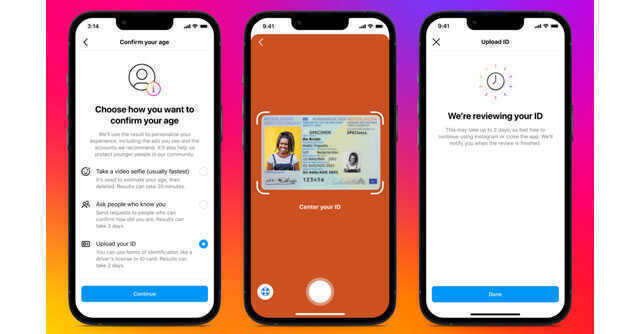
Privacy experts slam Instagram's new age verification trial


Legal and privacy experts in India have criticized Instagram’s new feature, designed to ask users for age verification documents. On Thursday, Meta expanded the trial phase for age verification for Instagram users to India and Brazil. The feature was so far available only in the US only.
The feature offers users three options to verify their age — uploading of ID, recording a video selfie, or asking a mutual friend to verify. The feature applies to users under 18 who try to update their date of birth on the platform.
“Verified accounts may be a safety net but to require social media users to submit identity cards which contain not just personal but sensitive personal information is certainly not a welcome move. More so when there are clear lacunae in law with respect to the security of such data,” said N.S. Nappinai, Supreme Court lawyer and founder of Cyber Saathi.

According to Meta, the company is testing these verification methods to ensure that teens and adults are in the right experience for their age group. The social media company said that it has partnered with Yoti, a company that specializes in online age verification, to ensure user privacy.
Most social media platforms, including Instagram, require users to be at least 13 years old to create an account. However, in some countries, the minimum age required is higher by law, in which case, users aged 13-17 are provided with age-appropriate experiences, which include preventing unwanted contacts by adults and limiting the reach of advertisers.
“Meta has committed to deleting the age verification measures after 30 days, it is not certain that other platforms will incorporate similar practices given that they would be interested in keeping records to allow for continued verification in case of an investigation against them to allay their own liability,” warned Trishee Goyal, research fellow at Vidhi Centre for Legal Policy.

According to Rule 4(7) of the Information Technology (Intermediary Guidelines and Digital Media Ethics Code) Rules 2021, significant social media intermediaries are required to enable users who register for their services from India to voluntarily verify their accounts using an appropriate mechanism, which can be an active Indian mobile number.
Rishi Anand, partner at law firm DSK Legal, points out that India does not have any law that mandates the use of government identification for verification to use a social media platform. “What Meta is doing with Instagram is likely in line with the company looking at taking a future-first view at how social media regulations may evolve. But, it is too early to say this is happening,” said Anand.
Vidhi’s Goyal pointed out that the manner in which age verification is carried out can itself be riddled with problems. One of the main concerns, she said, is to find a “balance between reliably verifying the age and avoiding a data maximization approach.”

“Use of official IDs for verification can cause children who want to access social media support communities anonymously, such as those suffering from domestic violence or sexual assault or sexual minorities, to withdraw from these support communities fearing a compromise on their anonymity,” she added.
Privacy experts also said that even asking users to upload a selfie video is a violation of privacy. “Asking users to upload a selfie video is also sensitive as it is personal data. Users share their photos or videos on social media because they want to, not because they are forced to,” said Nappinai, warning that verifying through a mutual friend, too, will help platforms link and trace users.
To be sure, many feel that a lack of regulatory clarity might lead to similar attempts by other social media platforms. For instance, DSK’s Anand said that the Draft Telecom Bill, released in September, mandated validating the identity of a person even on WhatsApp, and will eventually tie in to any social media platforms that offer messaging.

“But that is one for the long term, without any specific timeline to it, since the Telecom Bill will also go through multiple back-and-forths before being codified into law,” he added.
